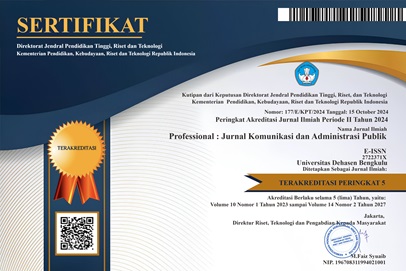Evaluasi Kebijakan Penyelenggaraan Posyandu Di Desa Lawang Agung Kabupaten Bengkulu Selatan
Abstract
This research aims to find out evaluation of policy on Posyandu organization in Lawang Agung Village, South Bengkulu Regency. Data collection techniques are carried out by means of interviews, observation, and documentation. After the research results were obtained, they were analyzed by collecting data, reducing data, presenting data and drawing conclusions. The informants in this study is 7 people consisting of 3 key informants and 4 main informants. The theory used in this research according to Wayne Parsons (2008: 549-552), there are two types of policy evaluation models used, namely Formative Evaluation and Summative Evaluation. Based on the research results, conclusions can be drawn, namely: 1. Formative Evaluation a. The integration of posyandu program in Lawang Agung village follows the guidelines of the Minister of Home Affairs Regulation No. 19 of 2011. b. Posyandu services are carried out with 5-table system in accordance with the provisions (DEPKES RI 2006), where tables 1-IV are the duties of cadres. While table V is a professional such as Doctors, Midwives, Nutrition Team, Kesling & Kespro and Nurses. d. The resources needed are human resources, facilities and infrastructure, additional food and budget funds, where the health fund budget is taken from 10% of APBD and ADD funds. 2. Summative Evaluation, a. Comparison of public health before and after the posyandu program is implemented, the comparison can be seen from the postnatal maternal mortality rate (MMR), infant mortality rate (IMR), as well as an increase in the community's healthy and clean lifestyle. b. The impact of the intervention on one main group or group that is not a control, no adverse effects have been found so far, there is only cooperation from the village government, Health Center and Health Office. c. Comparing what happened with what might have happened without intervention, the cooperation carried out is part of the functions and duties of the obligations of the village head. d. Regional division policy is based on the functions and duties of the village head. Regional division policy is based on population and village area so that the aim is to facilitate program implementation.
Downloads
Copyright (c) 2024 Endah Sanora, Evi Lorita, Harius Eko Saputra

This work is licensed under a Creative Commons Attribution-ShareAlike 4.0 International License.





